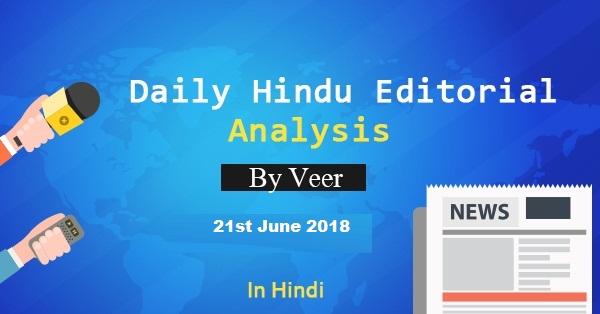Table of Contents
Beating plastic pollution
The focus must be on
Waste management and
Recycling
We celebrated ‘World Environment Day’ ( June 5) with a critical theme: beat plastic pollution.
Since India was the global host of this year’s event, and also one of the victims of plastic
pollution, we should view this danger seriously.
The theme urges governments, industries, communities and individuals to come together and explore sustainable alternatives.
It also urges this target group to reduce production and excessive use of single-use plastics,
which are polluting our environment and threatening human health.
Continue

Plastic was invented in New York in 1907 by Leo Baekeland.
Further, many chemists, including Nobel laureate Hermann Staudinger (father of polymer
chemistry) and Herman Mark (father of polymer physics), have contributed to the materials
science of plastics.
Due to their
Low cost,
Ease of manufacture,
Versatility(चंचलता),
Non-corrosiveness(गैर संक्षारक) &
Imperviousness(अभेद्य) to water,
plastics are used for multiple purposes at different scales.
Continue
Plastic has become an indispensable(अनिवायय) material in modern society.
Worldwide, one million plastic bags and one million plastic bottles are used every minute.
50% of our plastic use is single use (disposable)
Only 9% was recycled, 12% incinerated(destroy ), and 79% accumulated in landfills or the
environment.
In India, which accounts for almost 18% of the world population in 2.4% of the global
land area, the accumulation of plastic waste is huge
Each year, 13 million tonnes of plastic end up in the oceans- A study revealed that 20
rivers (mostly from Asia) carry two-thirds of plastic waste to the ocean.
The economic impact of plastic pollution on marine ecosystems through fisheries and tourism
losses and beach cleaning-up costs is estimated to be around $13 billion per year.
Drinking water samples analysed from 14 countries, including India, revealed that 83% have
micro-plastics concentrations
According to a United Nations Environment Programme report, the overall annual natural
capital cost of plastic use in the consumer goods sector is $75 billion
What should we do?- In reality-Cannot eliminate plastic use from our day-to-day activities.
However, we should not allow plastic to reach the soil or water.
Restrict plastic production and encourage recycling through appropriate policies.
Continue
Eco-friendly substitutes (cloth/paper/jute bags, leaves/areca leaf plates, paper straws)
should be developed.
For this, scientific and financial support (soft loans and subsidies) is required.
The ‘Plastic Waste Management Rules 2016’ need to be strictly followed
Charges for plastic bag use and deposit-refund for plastic bottles may be effective options.
The Swachh Bharat Mission should emerge as a platform for plastic waste management.
We cannot transform our world into a ‘plastic planet’.
What is needed is collective public effort to stop plastic pollution and safeguard
our ecosystem/biodiversity.
The seeds of sustainability

How Zero Budget Natural Farming could be the model for the future
In early June, Andhra Pradesh Chief Minister N. Chandrababu Naidu announced that
the State would fully embrace Zero Budget Natural Farming (ZBNF), a chemical-free method
that would cover all farmers by 2024.- AP has become 1
st State to implement a ZBNF policy.
Earlier in the year, he had revealed these plans at the meeting of the World Economic
Forum in Davos.
Highlights the way to improve
Welfare of farmers,
Reduce the cost of farm inputs,
Cut toxins in food, and
Improve soils
Continue
ZBNF plots in (kharif ) 2017 pilot phase were found on average 11% higher for cotton than
in non-ZBNF plots
Require locally available materials: seeds treated with cow dung and urine; soil rejuvenated
with cow dung, cow urine and other local materials
Input costs are near zero as no fertilizers and pesticides are used
Profits in most areas under ZBNF were from higher yield and lower inputs
In early 2016, Sikkim was declared India’s first fully organic State
Establishing a system that shows promise in improving them while supporting people sustain
ably is surely one worth pursuing.
Transmission troubles
RBI continues to remain unable to influence the effective lending rates in the economy.
In February, in its latest statement of intent to resolve poor monetary transmission, the RBI
said it would instruct banks to switch base rate customers to the marginal cost of funds-based
lending rate (MCLR) system from April 1, 2018.
In April 2016, it had introduced the MCLR regime, scrapping the base rate regime, in place
since 2010.
Since MCLR is more sensitive to policy rate signals, it has been decided to harmonise
the methodology of determining benchmark rates by linking the Base
Rate to the MCLR,” it had said.
This was supposed to push banks to lower lending rates
Prelims Focus Facts-News Analysis
Vohra takes charge in J&K, reviews security situation
Issues proclamation to impose Governor’s rule
Prelims Focus Facts-News Analysis
CEA resigns, cites personal reasons
Chief Economic Adviser Arvind Subramanian said on Wednesday that he was resigning
as he wished to return to the U.S. for personal reasons.
Prelims Focus Facts-News Analysis
U.S. quits UN human rights body
Blamed the UNHRC for bias against Israel and refusing to eject members who are
violators of human rights.
China offers to boost ties between India and Pakistan
Dineshwar Sharma will continue his mission
Rising oil prices to hit private consumption, says Urjit Patel
Shillong bags Smart City tag
India, South Korea to align policies for Southeast Asia
Map Practice

Last Day- Q’s- Answers…
44th G7 summit 2018: La-Malbaie, Quebec, Canada
U.S. and North Korea Meeting: Santosa Island, Singapore
Shanghai Cooperation Organisation(SCO) 2018: Qingdao, China
Shangri-La Dialogue 2018 edition : Singapore
Usain St. Leo Bolt: Jamaican’s Sprinter





















 WhatsApp
WhatsApp